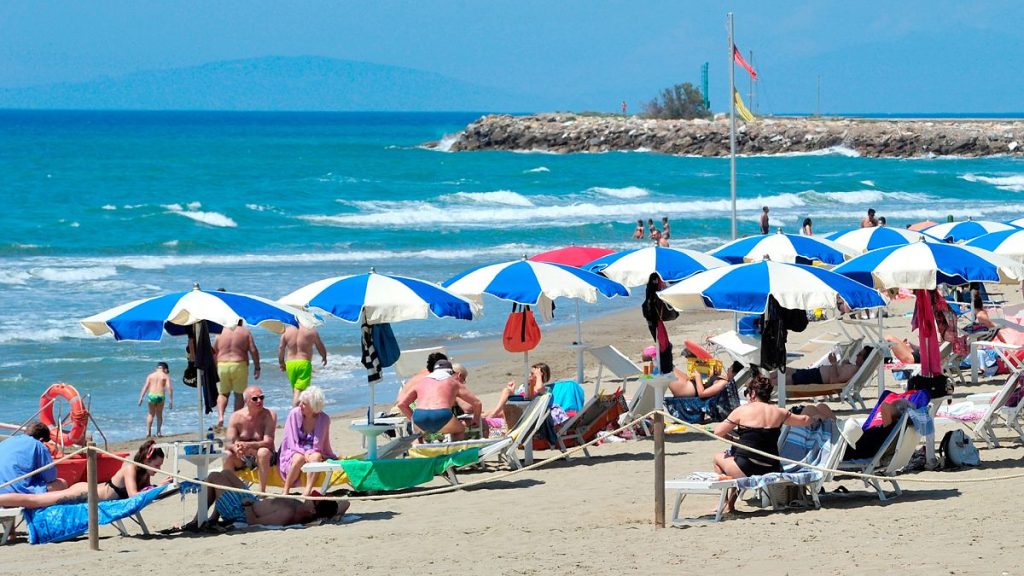Beach clubs, also known as lidos, have a significant impact on Italy’s economy, as the tourism sector accounts for around 6% of the country’s total GDP. In Fiumicino, a stretch of coastline an hour’s drive from Rome, beach concessions and the lack of a national law regulating them are the main talking points. The Bolkestein Directive, agreed in 2006, mandated that licenses for beach clubs be up for tender from January 2026, posing a threat to the traditional family-run businesses that have operated these beach clubs for generations. The Italian government has been slow to comply with this directive, leading to some beach club owners going on strike while others have formed groups to face the challenge of potentially losing their licenses.
Marco Lepre, a beach club operator in Fiumicino, has formed a group representing 11 business owners along the coastline. The aim of this initiative is to participate in the tenders that now seem inevitable due to the Bolkestein Directive, using their best tools and skills as a business network. Beach clubs in Italy are traditionally family-owned and have created a lifestyle that has been passed down from generation to generation. The Council of State ruled recently that concessions cannot be renewed automatically, adding to the effects of the infringement procedure initiated by the European Commission in 2020. Some trade organizations, such as Federbalneari Italia, have decided not to strike and are putting their trust in the government’s efforts to settle the dispute with the European Commission.
Elonora Poli, head of the Centro Politiche Europee think tank, highlighted the importance of having a national law regulating beach concessions in Italy. Italy risks facing expensive fines if there is no clear legal framework in place to govern the renewal of concession allocations for beach clubs. This issue has been ongoing for years and is not specific to the current government. Poli emphasized the need for rules at a national level to establish how concession allocations should be renewed, to be enforced by all municipalities and regions. With time running out and a lack of clarity in the legal framework, the consequences for Italy could be significant if a national law is not put in place.
The European Union’s Bolkestein Directive aims to increase competitiveness by freeing up the market in various sectors, including beach club concessions. This directive has put pressure on Italy to comply with EU competition rules and open up beach club licenses for tender. The traditional family-owned beach clubs in Italy face the risk of losing their licenses as a result of this directive. Some beach club operators have gone on strike in response to the potential loss of their businesses, while others have formed groups to tackle the challenge of tendering for licenses in the future.
The Italian government, under Meloni’s administration, has initiated negotiations with the European Commission to address the issue of beach club concessions. This move marks the first formal attempt in 15 years to negotiate a reform with the European Commission. Federbalneari Italia, a trade organization representing seaside workers, has expressed trust in the government’s actions and hopes for a resolution to the dispute. The government’s efforts to engage in negotiations with the European Commission are seen as a positive step towards resolving the complexities surrounding beach club concessions in Italy. The outcomes of these negotiations will have significant implications for the future of beach clubs and the tourism sector in Italy.
In conclusion, the regulation of beach club concessions in Italy is a complex and contentious issue that has implications for the country’s economy and tourism sector. The traditional family-run beach clubs face the risk of losing their licenses due to the EU’s Bolkestein Directive, which mandates that licenses be put up for tender. The lack of a national law regulating beach concessions has led to uncertainty and ambiguity in the sector, with potential consequences for Italy. The Italian government’s efforts to engage in negotiations with the European Commission are seen as a step towards resolving this issue, but the outcomes of these negotiations remain uncertain. It is crucial for Italy to establish clear rules at a national level to govern beach club concessions and avoid facing costly fines.


